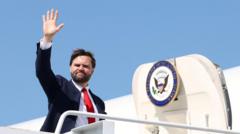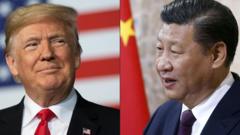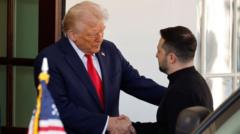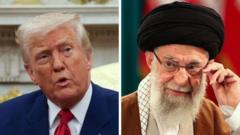The first 100 days reveal a transactional and often confrontational approach, reshaping global alliances and challenges.
Trump's Second Term: A Shift in Foreign Policy Dynamics

Trump's Second Term: A Shift in Foreign Policy Dynamics
As President Trump's second term unfolds, his foreign policy strategies spark significant debate.
During the early hours of a Munich hotel, an aide to Vice President JD Vance rushed to secure a critical minerals agreement with Ukraine, emblematic of President Donald J. Trump’s aggressive foreign policy initiatives. The late-night effort ended with a notable refusal from a senior Ukrainian official, illustrating the unconventional and high-pressure tactics characterizing Trump's recent dealings.
This approach signifies broader trends in Trump's second term—marked by unpredictability and exploitation of international relations. Critics argue that Trump's policies threaten established alliances and disrupt the global order established post-World War II.
In recent months, the ramifications of Trump's policies have heightened tensions with long-standing partners. For example, significant tariffs on Chinese imports have prompted retaliatory measures, underlining the transactional nature of Trump's diplomacy. Meanwhile, concerns loom over the possible withdrawal of American troops from Europe, raising alarms among allies about security and stability on the continent.
As the first 100 days conclude, Trump's foreign policy reflects a pivot towards an autocratic, transaction-focused paradigm that allies and adversaries alike are compelled to navigate, complicating the landscape of global affairs in unprecedented ways. The evolving situation promises to continuously reshape international relationships and establish a new precedent in global diplomacy.
This approach signifies broader trends in Trump's second term—marked by unpredictability and exploitation of international relations. Critics argue that Trump's policies threaten established alliances and disrupt the global order established post-World War II.
In recent months, the ramifications of Trump's policies have heightened tensions with long-standing partners. For example, significant tariffs on Chinese imports have prompted retaliatory measures, underlining the transactional nature of Trump's diplomacy. Meanwhile, concerns loom over the possible withdrawal of American troops from Europe, raising alarms among allies about security and stability on the continent.
As the first 100 days conclude, Trump's foreign policy reflects a pivot towards an autocratic, transaction-focused paradigm that allies and adversaries alike are compelled to navigate, complicating the landscape of global affairs in unprecedented ways. The evolving situation promises to continuously reshape international relationships and establish a new precedent in global diplomacy.




















